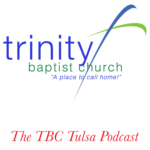
This exposition of Matthew 21:1-11 by Pastor Rod Harris was delivered at Trinity Baptist Church on Sunday morning, April 14, 2019.
Intro:
“It just didn’t make sense. It was not in keeping with what had been going on for the past three years. And it was dangerous. This was a time for laying low.
[sections collapse="always"][section title="Read More"]
This was a time to play it safe. Why take the risk? Why now? You know they are going to be looking for something like this. It’s suicide.” That must have been the confused reasoning of the disciples as Jesus made his approach to Jerusalem on the first day of that infamous week.
Weeks before, Jesus had “set his face as a flint for Jerusalem.” He resolutely determined to go there. Nothing could stop him – nothing would stand in his way. The time had come. That time established, by the Father, in eternity past, had now come. God’s eternal plan of redemption was now reaching its climax. For weeks Jesus has been preparing his disciples by focusing on the Kingdom. He has talked about its requirements – you must have the faith of a child, a simple, dependent faith. You must be willing to lose everything in order to obtain it. Jesus taught them that such a thing is impossible with man but possible with God. He taught them to look up for the Kingdom of God was near. History’s greatest drama is about to be played out as the Sovereign Creator of the universe mounts a donkey colt and makes his way toward Jerusalem. Our text this morning is found in Matthew chapter 21.
Text: Matthew 21:1-11
Matthew has crafted his Gospel to say to Jewish readers, “This is your Messiah.”
He has demonstrated that Jesus is a great teacher 5-7 (Sermon on the Mount).
He has revealed him as a great miracle worker.
He demonstrated that he is the fulfillment of the Law and the Prophets (Transfiguration).
Throughout his Gospel he has made it clear that the people responded favorably toward Jesus while the establishment despised him. Nowhere is that any clearer than in this passage.
Remember the context. Hostility has been mounting for years by this time. The more popular Jesus became with the crowd – the more threatened the establishment felt. He had to be silenced. They had to get rid of him – but how? Numerous meetings have been held. Various plots had been developed but none of them seemed to get off the ground. If only they could get him to come to Jerusalem. If they could just have him on their home turf.
That’s why it didn’t make sense to his followers. Why go to Jerusalem? Why now? Jesus would be playing into the hands of his enemies. And it appears as if he did. Albert Schweitzer the 19th century theologian described the Passion Week in terms of the Lord Jesus being “crushed in the wheels of history.” What Schweitzer failed to realize was that it was the Lord Jesus, himself, who was turning the wheel!
To Schweitzer the death of the Lord Jesus was the tragic end of a noble man who died before completing his great work. The fact is that his death was his great work!
As we explore this incredible story, we will discover that:
Thesis: The Triumphal Entry dramatically reveals the ultimate significance of Jesus’ life and ministry.
There are three things I want us to note.
- With His entrance into the city, our Lord boldly, deliberately and unapologetically declares himself King. (Matthew 21:1-8)
- Our Lord’s bold, public proclamation reveals He’s a very different kind of king: a peacemaker, reconciling sinful humanity to a holy God. (Matthew 21:9-10)
- His broken-hearted lament over the proud, unrepentant city demonstrates the depths of our Savior’s love. (Luke 19:41-44)
Conclusion:
He prophetically saw the proud, unrepentant Holy City as a pile of rubble wet with blood.
Look at him.
This is the heart of God.
This is the heart of the Savior.
This is how God sorrows over hearts that miss their “day” of salvation.
The tears of the Lord Jesus measure the value of your soul.
The question is will he weep over you?
I don’t believe it is possible to overestimate the significance of what happened that day in Jerusalem. The Triumphal Entry dramatically revealed the ultimate significance of Jesus’ life and ministry.
He is reveled as the Great Servant King.
He is seen as the Great Priest reconciling the world to God.
He is seen as the Great Prophet, weeping over the devastation of the proud and unrepentant.
Behold the Lord Jesus – Prophet, Priest and King.
[/section][/sections]

